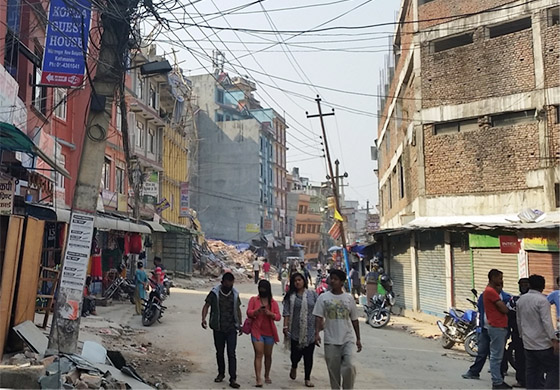
Kathmandu, 25 May 2015 - One month after the earthquake of 25 April, the National Planning Commission of Nepal hosted an expert meeting convened by UN-Habitat to review the challenges of urbanization and reconstruction. The lead questions are to identify urban drivers for national recovery and to encourage future resilient urbanization.
Unplanned urbanization expands future risk. It will be extremely challenging to undertake reconstruction in many high-density urban neighbourhoods and in dense historic urban and peri-urban townships. A new surge in migration from affected rural areas is likely to further impede the complexities. The urban poor are most at risk.
A key question emerging is the provision of safe rental accommodation, from hosting in the forthcoming months to encouraging the building new rental housing stock. The urban poor depend largely on often overcrowded rental accommodation, which represents the bulk of the damaged urban properties in Kathmandu, as they were of poor quality and floors had been added incrementally without supervision. Damage assessments are still underway.
The same situation is evident in neighbourhoods with cheap guesthouses lodging visitors from rural areas and those waiting to travel to overseas jobs. The Mitrangar New Buspark guesthouse neighbourhood in Kathmandu (pictured) experienced heavy damage and many casualties.
Building back better
In the past 30 days, UN-Habitat has been assisting the Shelter, WASH and Early Recovery Clusters and has mobilized assistance from Japan and Chinese, Norwegian and Swedish partners to first assist vulnerable households and subsequently expand the advocacy for building back better in rural and semi-urban communities.
The United Nations has started updating its Appeal taking into account the more recent quake of 12 May and the approaching monsoon. Shelter and access to safe water remain acute needs for about 500,000 households, of which one out of four are very vulnerable.
The intensity of the twin earthquakes has caused extensive damage, particularly in rural areas and small market towns. UN-Habitat has started to coordinate a Working Group on Shelter Recovery, mounting a collaboration with the International Federation of the Red Cross - the Shelter Cluster Lead, the Norwegian Refugee Council standby roster, NORCAP and Habitat for Humanity.
This group will work with partners and the Government to seek new and effective cooperation frameworks in the months ahead, building on good practices and owner-driven and government-supported shelter reconstruction established in earlier disasters.
Planning for urban growth
UN-Habitat is also providing experts for the formulation of the Post Disaster Needs Assessment (PDNA), with regard to housing and settlements, water and sanitation and governance.
UN-Habitat has organized consultations with key national resource persons to introduce options to address the emerging urban challenges. Specific area-based typologies for recovery and reconstruction must be recognized, provided with participatory planning assistance and supported with appropriate financial mechanisms. Planned extensions of market towns and of semi-urban areas in the Kathmandu Valley are required.
Furthermore, the rate of urbanization is expected to further increase after the earthquakes in the lowland “Terai” areas. Where urban development is fast, rapid planning should aim at preventing new areas which are underserviced and overcrowded. They can introduce more efficient urbanisation patterns, better public spaces and more adequate supporting regulations.







